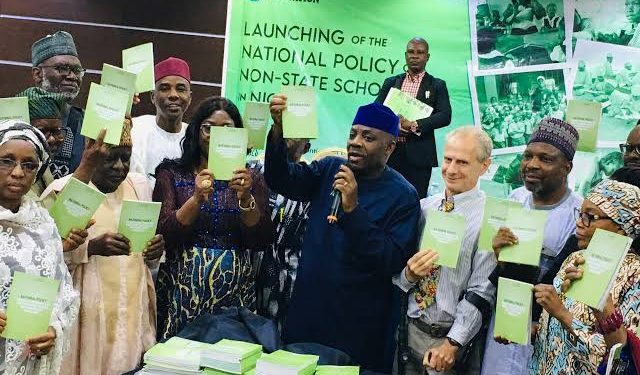The Federal Government has introduced a comprehensive policy to regulate non-state schools in Nigeria, setting clear standards for infrastructure, curriculum, and teacher qualifications. The move is part of a broader national effort to improve the quality of education and ensure accountability in the country’s rapidly expanding private and informal education sector.
Non-state schools refer to educational institutions operating outside direct government control. These include private and faith-based schools, homeschooling setups, adult learning centers, community-run schools, tutorial centers, and charity-supported institutions.
Supported by the UK’s Foreign, Commonwealth and Development Office under the Partnership for Learning for All in Nigeria (PLANE), the new policy forms a key component of President Bola Tinubu’s National Education Sector Renewal Initiative (NESRI), which aims to reposition education at the heart of national development.
Speaking at the policy launch, the Minister of Education said the new framework sets clear rules for the operation of non-state schools. These include mandatory quality assurance measures, improved collaboration with government agencies, and minimum requirements for teaching staff and learning environments.
He noted that the rapid rise of non-state schools growing by 39 percent between 2017 and 2022 stands in contrast to modest increases of 3.5 percent and 6.3 percent in government-owned primary and junior secondary schools respectively. While non-state schools help fill the educational gap, he stressed the need for proper regulation and government support to enhance the quality of learning provided.
Beginning with the 2025–2026 school year, the government plans to provide indirect reimbursements to private school operators who enrol out-of-school children. In addition, grants and education vouchers will be made available to privately owned early childhood centers through the Universal Basic Education Commission (UBEC).
Addressing concerns about the teaching workforce, the Teachers Registration Council of Nigeria (TRCN) revealed that more than 85 percent of those currently teaching in private schools are not registered. The TRCN announced that it would begin strict enforcement of teacher registration, certification, and licensing under the new policy framework, while also streamlining the process to support compliance among private school educators.
The Senior Education Adviser at the British Council praised the initiative, highlighting how non-state schools have emerged to fill the vacuum created by Nigeria’s fast-growing population and under-resourced public education system. He traced the growing recognition of informal private schools back to early research, including the work of UK academic James Tooley, who documented how private institutions were serving millions of children beyond the government’s oversight.
He noted that cities like Lagos, which have expanded dramatically from around 250,000 residents in 1960 to over 15 million today, demonstrate how public education systems have failed to keep pace with urban growth. In response, non-state education has flourished organically to meet rising demand.
The UK, he added, continues to work with Nigeria on progressive education policies that support access to affordable, quality schooling—especially for marginalized communities left behind by the formal system.
With this new regulatory framework, Nigeria is taking a significant step toward ensuring that all children regardless of where they attend school receive quality education backed by strong standards, professional teaching, and government accountability.










